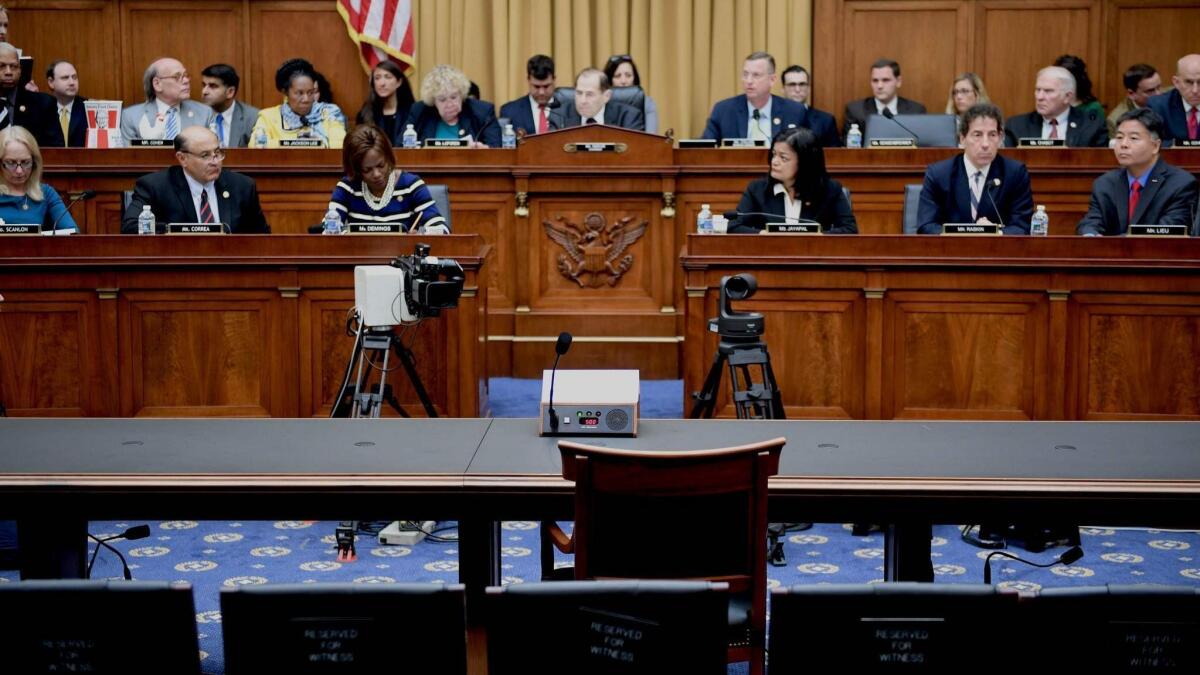Democrats’ impeachment bumblings are damaging Congress’ strongest check on the president

- Share via
Just days after the House Judiciary Committee’s hearing with former special counsel Robert S. Mueller III, a top Judiciary Democrat claimed “impeachment isn’t a binary thing that you either are or you aren’t.” Under House rules and precedent, however, impeachment has a clear, formal process — for good reason.
House precedent requires the full House approve a resolution authorizing the Judiciary Committee to begin an impeachment inquiry. Otherwise, any Judiciary chairman could charge into an impeachment inquiry with only limited, partisan support.
House Democrats, however, have not moved forward on a vote to start an impeachment inquiry, because Speaker Nancy Pelosi (D-San Francisco) wants to avoid a direct vote on impeachment proceedings. She isn’t willing to imperil caucus members in swing districts like the one in north Atlanta, where at least 60% of the people represented by Lucy McBath (D-Ga.) cringe at the prospect of impeachment, but at the same time, the Democrats continue to use impeachment rhetoric to pretend they’ve started the process to satisfy their liberal base. They can’t have it both ways.
There’s a simple test for determining whether the House is formally moving to impeach the president: Has the full House voted to authorize an impeachment inquiry, and is the House considering articles of impeachment? The answer to both questions is no.
Both the Nixon and Clinton impeachment inquiries began with a full House vote that authorized them, because the power to impeach the president resides in the whole House. Nonetheless, four Democrats on the Judiciary Committee have claimed Article I of the Constitution, which outlines the powers of Congress, “authorizes the House Judiciary Committee to begin this process” unilaterally -- even though the Constitution says no such thing.
In the past, when lawmakers determined impeachment may be warranted, the Judiciary Committee sought full House approval to start an inquiry. The Constitution vests the House with the sole power to commence impeachment, and the House has never given blanket delegation of this authority to any committee because considering the removal of a duly-elected president shouldn’t ride solely on the whims of any committee chairman.
Already, House Democrats are struggling to play by — or even understand — the rules governing impeachment. On May 15, Rep. Karen Bass (D-Los Angeles) rightly said of the committee’s investigation: “The process is extremely important. It’s important that we go through each one of these steps and then we make a decision.” As of July 30, 106 House Democrats supported opening an impeachment inquiry because they understand that such an inquiry has not been formally launched.
In contrast, Rep. Ted Deutch (D-Fla.) claimed on Aug. 1 that the inquiry actually began on March 4 with 81 document requests, saying, “In every meaningful way, our investigation is an impeachment inquiry.” If the impeachment inquiry has been chugging along for months, someone may want to counsel other Democrats to stop asking to open it.
The stakes are too high to pretend that a congressional impeachment inquiry can be a matter of personal interpretation. Referring presidential articles of impeachment to the House without first being authorized to embark on a formal inquiry is unprecedented and would be one of the most irresponsible acts of the House Judiciary Committee’s 206-year history.
Democrats seem to believe, when it comes to holding this president accountable, that the ends justify the means and that they shouldn’t be constrained by House procedure when our democracy is under siege. In reality, they may do more to harm our democracy than any president ever could.
By misrepresenting the impeachment process, Democrats risk politicizing and destroying Congress’ most powerful constitutional check on the executive. I’m not worried about the president’s interests here. I’m worried that Democrats’ political bumblings are weakening the strongest recourse our chamber has to hold any resident of 1600 Pennsylvania Ave. accountable.
Rep. Doug Collins represents Georgia’s 9th Congressional District and is the ranking Republican member on the House Judiciary Committee.
More to Read
A cure for the common opinion
Get thought-provoking perspectives with our weekly newsletter.
You may occasionally receive promotional content from the Los Angeles Times.









